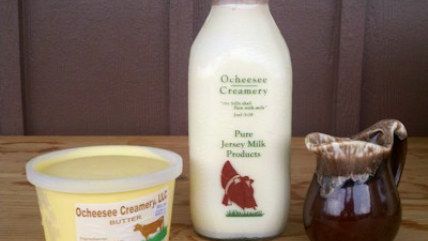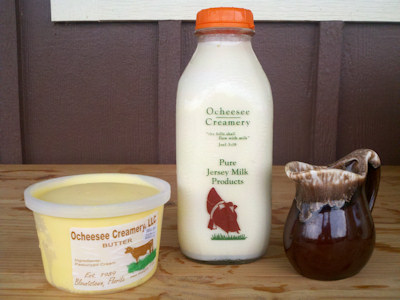Appeals Court Embraces Free Speech, Rules Skim Milk is 'Skim Milk'
The 11th Circuit Court of Appeals dealt an important ruling for food freedom this week.


"The leftover product is skim milk: milk that has had the fat removed through skimming."
If those words—from a unanimous 11th Circuit Court of Appeals ruling earlier this week—sound like some sort of dicta—words in a court decision which represent a judge's ideas or observations but aren't part of the holding of the case and which, therefore, carry little legal weight—then it may surprise you to learn the question of whether all-natural skim milk is skim milk actually go to the heart of the case in question.
The case, Ocheesee Creamery v. Putnam, has its roots in 2012, when Florida's state agriculture department ordered Ocheesee, a small creamery in the state's panhandle, to stop selling its skim milk. The state claimed Ocheesee's skim milk ran afoul of Florida's standard of identity for skim milk, which requires creameries and dairies to add vitamin A to their skim milk.
In response, Ocheesee, which prides itself on its all-natural milks, proposed instead of introducing vitamin A additive to its milk to label its skim milk as "Pasteurized Skim Milk, No Vitamin A Added."
The state rejected that label, telling Ocheesee they could sell their skim milk only if it were labeled as "Non-Grade 'A' Milk Product, Natural Milk Vitamins Removed" or, later, as "imitation skim milk." For a state that argued it was in the business of protecting consumers, and that Ocheesee's use of the term "skim milk" to describe its skim milk (ingredients: skim milk) was misleading, it's worth noting both of Florida's recommended terms for a skim milk that contains only skim milk are patently and grossly misleading.
Ocheesee was forced to sue the state. Last year, the U.S. District Court sided with the Florida regulators.
The appeals court win this week is an important victory not just for Ocheesee Creamery but also for free speech, consumers, small businesses, and food freedom. It's also a big win for the Institute for Justice, which represented the plaintiff creamery.
"This decision is a total vindication for Ocheesee Creamery and a complete rejection of the Florida Department of Agriculture's suppression of speech," said Justin Pearson, a senior IJ attorney, in a statement this week. "Today, thanks to the 11th Circuit, [Ocheesee owner] Mary Lou [Wesselhoeft] is no longer denied her First Amendment right to tell the truth."
I served as an expert witness for Ocheesee Creamery in the case—writing an expert report and testifying in a deposition on its behalf—and describe the case in some detail in my book, Biting the Hands that Feed Us: How Fewer, Smarter Laws Would Make Our Food System More Sustainable. Like Pearson, I couldn't be happier with the outcome of the 11th Circuit case.
The intervention of one of America's largest dairy lobbies into the case in support of the Florida regulations—which I wrote about in September—is one interesting facet of the case.
"Food processors, such as Ocheesee, who choose not to replenish essential nutrients to the standardized level, must label those products as 'imitation,'" the International Dairy Foods Association argued.
Thankfully, the 11th Circuit Court saw otherwise.
As I've argued for years—and first argued in a 2012 column here—food labels should be open "to any and all statements that aren't demonstrably false."
Use of terms like "natural," "almond milk," and "Just Mayo" on food labels are not the least bit misleading. Government efforts to stifle such speech and to rewrite the meaning of common dictionary terms to fit government ends are draconian, Machiavellian, Orwellian, and all sorts of other bad things ending in the suffix "-ian."
What's next for the Ocheesee case? I suspect Florida will ask the U.S. Supreme Court to take up its appeal of the case. That's when things could get even more interesting.
If the U.S. Supreme Court decides not to hear Florida's appeal, then the 11th Circuit Court's ruling will be the law of the land in Florida, Alabama, and Georgia, the three states within the court's jurisdiction. On the other hand, if the Supreme Court chooses to take up the case—a distinct possibility—and to uphold the 11th Circuit's ruling—another distinct possibility—then many state and federal standards of identity could rightly be in peril. The FDA's own requirements for skim milk—which form the basis for Florida's standard—could be challenged.
But even if Florida doesn't appeal, or the Supreme Court decides the time isn't ripe to hear the Ocheesee case now, the toothpaste may already out of the tube. That's because the 11th Circuit ruling covering three adjoining states—Florida, Alabama, and Georgia—means some enterprising dairy could begin transporting skim milk across state lines from one of those three states to another of those three states. As soon as the milk crossed state lines, it would be in violation of FDA rules, which govern interstate commerce.
Now suppose the FDA were to seize those shipments in interstate commerce. Where might a Florida, Alabama, or Georgia dairy or creamery that's been told by the FDA that it's run afoul of agency rules pertaining to the addition of vitamin A to skim milk take its case? More than likely, they'd take it to U.S. District Court in Florida, Alabama, or Georgia, federal courts which are bound by the precedent established by the 11th Circuit—assuming the same facts are in evidence—and, I suspect, rule against the FDA. Of course, the FDA would appeal such a ruling. Who would hear the appeal? The 11th Circuit, the same court that just ruled against the Florida regulations.
Free speech won an important victory this week. Thanks to this win, I'm optimistic Florida's skim milk rules are the first of many similar ones that will fall in the coming months and years.


Show Comments (65)